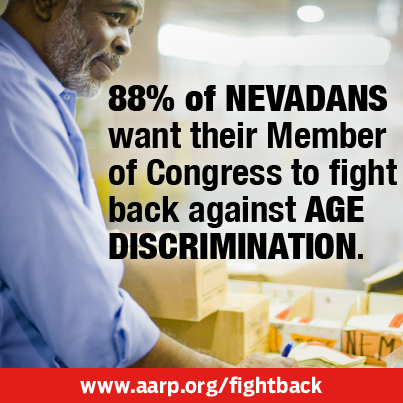AARP Hearing Center

Older Nevadans overwhelmingly support bipartisan legislation to combat age discrimination in the workplace, a new AARP survey shows.
The poll conducted this month of registered voters 50 and older found a remarkable 85 percent favor passage of the bipartisan "Protecting Older Workers Against Discrimination Act" (POWADA).
In contrast, only 8 percent oppose passage, the survey reported.
"This AARP survey confirms what Nevadans know: huge majorities demand fairness for older workers," said Hilarie Grey, communications director for AARP Nevada. “And that support bridges all political ideologies,” as confirmed by the survey’s finding that at least 85 percent of moderates, liberals, and conservatives alike endorse POWADA.
The legislation, sponsored by Republican Chuck Grassley and Democratic Senators Tom Harkin and Patrick Leahy, is designed to overturn a divided (5-4) U.S. Supreme Court decision (Gross v. FBL Financial Services) that made it much more difficult for older workers to prove claims of illegal bias based on age.
The survey found that over one-third of Nevadans reported that they or someone they know has experienced age discrimination.
The Gross decision substantially toughened the standard that older workers must meet in order to prove that his or her employer violated the federal Age Discrimination in Employment Act (ADEA). Unfortunately, that decision means many older workers will never see their day in court, and it is now being applied by some courts to restrict the rights of employees in other types of employment discrimination cases too. For example, a federal court of appeals in Cincinnati applied the Gross ruling to limit rights to challenge disability-based bias under federal law.
For decades, if an older worker showed that age was one motivating factor in an adverse employment decision, even if other motives also played a role, the employer had to prove that it would have made the same decision without considering the employee’s age. Since the Gross decision, employees instead must prove that the employer would not have taken the adverse action "but for" their age -- in other words, that age played the determining role -- a significantly higher standard of proof.
The legislation would restore the old standard and help ensure that employees have a level playing field when fighting age discrimination in court.
The AARP survey of Nevadans conducted by telephone from March 4 to March 8, found 93 percent think older Americans should be protected from age discrimination just like they are from sex or race discrimination, and 88 percent agreed that "Congress needs to do more to ensure people over 50 continue to have an equal opportunity to work for as long as they want or need to - regardless of their age."
Once again, only 8 percent opposed Congressional action, according to the survey.
The age discrimination bill is gaining traction at a difficult time for older workers. National unemployment has declined somewhat since the official end of the Great Recession in 2009, but it remains high. And the average length of unemployment between jobs for older workers is at an all-time high -- well over a year. Of those polled in Nevada, 81 percent said they believe "age would be an obstacle to finding work."
Take action: Ask your member of Congress to fight back against age discrimination































































